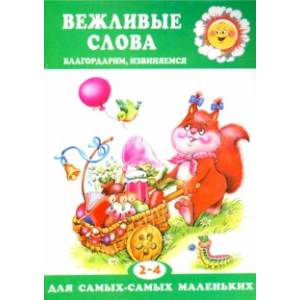Polite words. Thank you, apologize. For children 2-4 years old
Please sign in so that we can notify you about a reply
Dear adults!
Surely most parents happened to feel awkward when their child instead of saying goodbye or thank, fled, or turned away, or looked at the floor. Entertaining adults condescendingly “missed” this situation, and their parents were ashamed: they, in essence, educated people, such an ill -mannered child. And it’s good if his mother, having embarrassedly thanking the child, did not begin to pronounce him or, even worse, punish him.
But the child, doing this, had no evil intentions. He, firstly, could still not realize (especially in 2-3 years old) that if you say "thanks" to his native granny for a delicious soup, then you should also do with the seller in the store, and with good aunt at a party, which gave the toy. Secondly, perhaps he was completely captured by this very wonderful toy, which was just given, and he did not realize what they want from him.
And, finally, the baby could elementarily shy to say "polite words" to stranger adults, especially if all their attention is directed at him, and even cry.
So what to do to teach the baby politeness?
First of all, do not assume that you can do this immediately as soon as the child "Magic Words" remembers. The kid will learn to tell them gradually.
But for this you need to be a very example for the baby. It is useless to constantly remind of the words of politeness, if you yourself do not use them either in relation to the child, or in relation to other people and you talk with a dismissive tone. After all, children learn primarily from close adults.
- Always tell the baby "thank you" and "please". He will learn to politely ask and thank you according to your example.
- Mark when the child pronounces "polite words": "I liked how you asked (thanked)". And, on the contrary, when you don’t like, as the baby asks, say: "Ask differently" or "I don’t want to help you, because I don’t like how you ask. ”
- Teach the child to respect someone else"s property and personal space of another person.
Our book will remind the child, what polite words are in our everyday life. It contains two types of classes with the baby: examining the illustrations, conversation on it with the help of texts -sublocations on the left page and reading the poem and its discussion.
With the apparent simplicity of the book, your baby will remember "polite words" if you emotionally participate in the discussion with the child and read the texts "vividly" and expressively.
Edition of developing education for preschool children
Surely most parents happened to feel awkward when their child instead of saying goodbye or thank, fled, or turned away, or looked at the floor. Entertaining adults condescendingly “missed” this situation, and their parents were ashamed: they, in essence, educated people, such an ill -mannered child. And it’s good if his mother, having embarrassedly thanking the child, did not begin to pronounce him or, even worse, punish him.
But the child, doing this, had no evil intentions. He, firstly, could still not realize (especially in 2-3 years old) that if you say "thanks" to his native granny for a delicious soup, then you should also do with the seller in the store, and with good aunt at a party, which gave the toy. Secondly, perhaps he was completely captured by this very wonderful toy, which was just given, and he did not realize what they want from him.
And, finally, the baby could elementarily shy to say "polite words" to stranger adults, especially if all their attention is directed at him, and even cry.
So what to do to teach the baby politeness?
First of all, do not assume that you can do this immediately as soon as the child "Magic Words" remembers. The kid will learn to tell them gradually.
But for this you need to be a very example for the baby. It is useless to constantly remind of the words of politeness, if you yourself do not use them either in relation to the child, or in relation to other people and you talk with a dismissive tone. After all, children learn primarily from close adults.
- Always tell the baby "thank you" and "please". He will learn to politely ask and thank you according to your example.
- Mark when the child pronounces "polite words": "I liked how you asked (thanked)". And, on the contrary, when you don’t like, as the baby asks, say: "Ask differently" or "I don’t want to help you, because I don’t like how you ask. ”
- Teach the child to respect someone else"s property and personal space of another person.
Our book will remind the child, what polite words are in our everyday life. It contains two types of classes with the baby: examining the illustrations, conversation on it with the help of texts -sublocations on the left page and reading the poem and its discussion.
With the apparent simplicity of the book, your baby will remember "polite words" if you emotionally participate in the discussion with the child and read the texts "vividly" and expressively.
Edition of developing education for preschool children
Author:
Author:Migunova Natalya Alekseevna
Cover:
Cover:Soft
Category:
- Category:Children's Book
Series:
Series: for the smallest
ISBN:
ISBN:9785994924037
No reviews found
